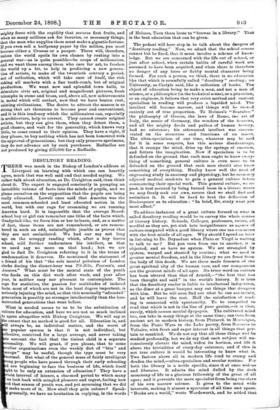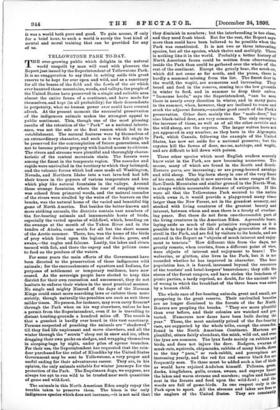DESULTORY READING.
THERE was much in the Bishop of London's address at Liverpool on learning with which one can heartily agree, much that was well said and that needed saying. We rather talk about education, as Dr. Creighton said, than think about it. The expert is engaged constantly in pumping an incredible volume of facts into the minds of pupils, and we plume ourselves on the supposition that the pupils are being really educated. Lowell once said that America was the most common-schooled and least educated nation in the world, but with our rage for cramming we are running America hard, it is impossible that the average Board- school boy or girl can remember one tithe of the facts which, Gradgriud-like, we force him or her to learn, and, as a matter of fact, these items are not remembered, or are remem- bered in such an odd, unintelligible jumble as proves that they are not assimilated. We had our say not long ago on the scrappy reading which, after a boy leaves school, still further undermines his intellect, so that we need say no more on that head ; but we are glad to find Dr. Creighton referring to it in the terms of condemnation it deserves. He mentioned the statement of a friend of his that "the sole mental pabulum of London clerks during the dinner-hour was Tit-Bits, Pearson's, and Answers." What must be the mental state of the youth who feeds on this diet week after week, and year after year, is neither easy nor pleasant to contemplate. The rage for statistics, the passion for multitudes of isolated facts, most of which are not in the least degree important, is seriously injuring the mind, so that this nominally "educated" generation is possibly no stronger intellectually than the less- instructed generations that went before.
What is needed seems to us to be the substitution of culture for education, and here we are not so much inclined to agree altogether with Bishop Creighton. We will say at e outset that no method is good for all. Education is, and always be, an individual matter, and the worst of Ur popular system is that it is not individual, but llective, contrived for a large average, and never taking to account the fact that the tiniest child is a separate rsonality. We will grant, if you please, that to some uliar organisations even the weekly diet of " bits " and scraps" may be useful, though the type must be very normal. But what of the general mass of fairly intelligent ung people who have passed through their early schooling d are beginning to face the business of life, which itself ght to be only an extension of education ? They have a rtain interval of leisure, a charmed period to which many us look back with mingled pleasure and regret, feeling how od that season of youth was, and yet mourning that we did t make more of it. How shall they gain culture? Speak- generally, we have no hesitation in replying, in the words of Holmes, Tarn them loose to "browse in a library." That is the best education that can be given.
The pedant will here step in to talk about the dangers of "desultory reading." Now, we admit that the school course cannot but be fixed, that it must involve a scheme of know- ledge. But we are concerned with the life out of school, or just after school, when certain habits of careful work are assumed to have been acquired, and when there is therefore no danger of any loose or flabby mental character being formed. For such a person, we think, there is no education like that which is scornfully called " desultory " reading ; no University, as Carlyle said, like a collection of books. The object of education being to make a man, and not a man of science, or a philosopher (in the technical sense), or a physician, or an engineer, it follows that very strict method and militant specialism in reading will produce a lopsided mind. The intellect will become narrow, and things will be viewed entirely out of true proportion. To Holmea's " Scarabee " the philosophy of Greece, the laws of Rome, tiie art of Italy, the music of Germany, the wonders of the heavens, and all the mighty deeds and pathos of human history, had no existence ; his attenuated intellect was concen- trated on the structure and functions of an insert. The ultra-specialism of our time, whatever may be said for it in some respects, has this serious disadvantage, that it cramps the mind, dries up the springs of emotion, and fetters the imagination. Now if specialism is to be defended on the ground that each man ought to know every- thing of something, general culture is even more to be defended on the ground that each man should also know something of everything. Huxley knew well the need of engrossing study in anatomy and physiology, but he earnest ly adjured medical students to gain a general culture laetore commencing their special work. This general culture, we re- peat, is beat secured by being turned loose in a librarv wocre we may freely seek our own, secure that we shall find and assimilate it. It will be hard to beat the defiudion of Shakespeare as to education : "In brief, Sir, study woat you most affect."
To adduce instances of a great culture formed on what is called desultory reading would be to survey the whole course of literary history. Schools, Colleges, professors, tutors, all needful as they are, yet sink into insignificance as agents of culture compared with a good library where one can commune with the best minds of all ages. Why should I spend au hour in listening to Dr. Dryasdust when Plato or Virgil is waiting to talk to me ? But you turn from one to another, it is objected, and so have no system. We are strangled by system, warped and stunted by routine ; what we need is greater mental freedom, and in the library we are freed from the body of this death. We are there made freemen of the great spiritual city of the human race, and our companions are the greatest minds of all ages. No truer word on culture has been uttered than that of Arnold,—" the best that hag been thought and said" in the world's history. It is true that the desultory reader is liable to intellectual indigestion, as the diner at a great banquet may eat things that disagree with him. But he will soon find out what he can assimilate, and he will leave the rest. Half the satisfaction of read- ing is connected with spontaneity. To be compelled to read that which is not in the line of your genius,—it is that, surely, which causes mental dyspepsia. The cultivated mind too, can take in many things at the same time ; can turn from ancient art to modern history, from Plutarch to Montaigne, from the Punic Wars to the Lake poetry, from Socrates to Voltaire, with fresh and eager interest in all things that per- tain to mankind. We do not say that all these things will be studied profoundly, but we do say that each subject will un- consciously elevate the mind, widen its horizon, and lift it above the trivialities of every-day existence, and if this is. not true culture it would be interesting to know what is. Two factors above all in modern life tend to cramp and deaden the mind,—ultra-specialism and secular routine. Pir both the library is a noble specific, since it at once widens and liberates. It admits the mind dulled by the drab monotony of life to a glorious fellowship of the great of all ages; and it prevents the mere specialist from being t he slave of his own narrow science. It gives to the mind wide interests, making it almost a spectator of all time and space. "Books are a world," wrote Wordsworth, and he added that
it was a world both pure and good. To gain access, if only for a brief hour, to such a world is surely the best kind of mental and moral training that can be provided for any of us.







































 Previous page
Previous page